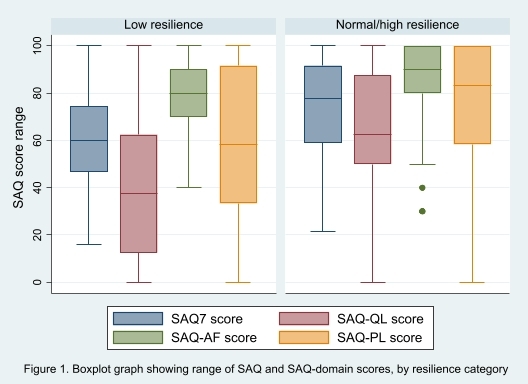Final ID: P3136
Association between resilience and health status among adults after myocardial infarction
Abstract Body: Introduction: Women and men may recover from myocardial infarction (MI) differently. Resilience promotes psychological recovery post-MI but its association with health status, including health-related quality of life, angina frequency, and physical limitations, has been underexplored.
Hypothesis: We hypothesized that higher resilience would be associated with better post-MI health status, and that this relationship would be stronger among women compared to men.
Methods: We analyzed a cross-sectional sample of adult participants in the Heart Attack Research Program, a longitudinal study of adults post-MI. Resilience was measured with the Brief Resilience Scale (BRS), range 0-6, and dichotomized to low (BRS score <3) and normal/high (BRS score ≥ 3) resilience. We used Wilcoxon rank-sum tests to assess differences in scores of overall health status (Seattle Angina Questionnaire [SAQ-7]) and its 3 domains – angina frequency (SAQ-AF), physical limitations (SAQ-PL), and quality of life (SAQ-QL), by resilience group. We used multivariable linear regression to examine the association between SAQ scores and resilience. Covariates included age, sex (except in sex-stratified analyses), race, ethnicity, BMI, history of diabetes, hypertension, or hypercholesterolemia, and prior history of MI.
Results: The study sample included 161 participants, 38% female, 76% white, with a mean age of 63±13 years. Median time from MI to data collection was 37 days, interquartile range [IQR 21-59 days]. Median SAQ7 score was 75 [IQR 57-89], and 19% of participants reported low resilience. Wilcoxon rank-sum tests showed significant differences in SAQ7, SAQ-QL, and SAQ-AF scores among those with low vs normal/high resilience, p=0.002, p=0.001, p=0.006, respectively, but not in SAQ-PL scores (Figure 1). After full adjustment, SAQ7 and SAQ-QL scores were positively associated with resilience (β 0.21, p=0.01 and β 0.25, p=0.003, respectively), but SAQ-AF and SAQ-PL were not (p=0.201 and p=0.184, respectively). When stratified by sex, the associations between SAQ7 and SAQ-QL, and resilience remained significant among female participants (β 0.33, p=0.036 and β 0.33, p=0.030, respectively), but not among male participants.
Conclusions: Normal/high resilience was associated with better health status and higher health-related quality of life among this post-MI cohort, and particularly among women. Resilience building interventions may be considered as strategies to improve post-MI recovery.
Hypothesis: We hypothesized that higher resilience would be associated with better post-MI health status, and that this relationship would be stronger among women compared to men.
Methods: We analyzed a cross-sectional sample of adult participants in the Heart Attack Research Program, a longitudinal study of adults post-MI. Resilience was measured with the Brief Resilience Scale (BRS), range 0-6, and dichotomized to low (BRS score <3) and normal/high (BRS score ≥ 3) resilience. We used Wilcoxon rank-sum tests to assess differences in scores of overall health status (Seattle Angina Questionnaire [SAQ-7]) and its 3 domains – angina frequency (SAQ-AF), physical limitations (SAQ-PL), and quality of life (SAQ-QL), by resilience group. We used multivariable linear regression to examine the association between SAQ scores and resilience. Covariates included age, sex (except in sex-stratified analyses), race, ethnicity, BMI, history of diabetes, hypertension, or hypercholesterolemia, and prior history of MI.
Results: The study sample included 161 participants, 38% female, 76% white, with a mean age of 63±13 years. Median time from MI to data collection was 37 days, interquartile range [IQR 21-59 days]. Median SAQ7 score was 75 [IQR 57-89], and 19% of participants reported low resilience. Wilcoxon rank-sum tests showed significant differences in SAQ7, SAQ-QL, and SAQ-AF scores among those with low vs normal/high resilience, p=0.002, p=0.001, p=0.006, respectively, but not in SAQ-PL scores (Figure 1). After full adjustment, SAQ7 and SAQ-QL scores were positively associated with resilience (β 0.21, p=0.01 and β 0.25, p=0.003, respectively), but SAQ-AF and SAQ-PL were not (p=0.201 and p=0.184, respectively). When stratified by sex, the associations between SAQ7 and SAQ-QL, and resilience remained significant among female participants (β 0.33, p=0.036 and β 0.33, p=0.030, respectively), but not among male participants.
Conclusions: Normal/high resilience was associated with better health status and higher health-related quality of life among this post-MI cohort, and particularly among women. Resilience building interventions may be considered as strategies to improve post-MI recovery.
More abstracts on this topic:
Assessing the causal associations of obstructive sleep apnea syndrome and hypertension: a bidirectional two-sample Mendelian randomization study
Tao Jing
Assessing Content Validity of EQ-5D-5L in Out-of-Hospital Cardiac Arrest Survivors: Cognitive Interviewing and Comparative Concept Mapping with HUI3 and SF-36Pek Pin Pin, Oh Ying Zi, Peck Kah Hua, Ong Marcus, Luo Nan, Win Phyo Thet Naing, Malhotra Rahul, Ostbye Truls, Ho Andrew Fu Wah, Lim Shir Lynn, Uy Felix Maverick Rubillar, Ho Vui Kian, Chua Jia Min

